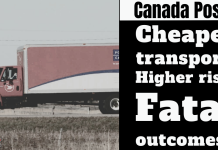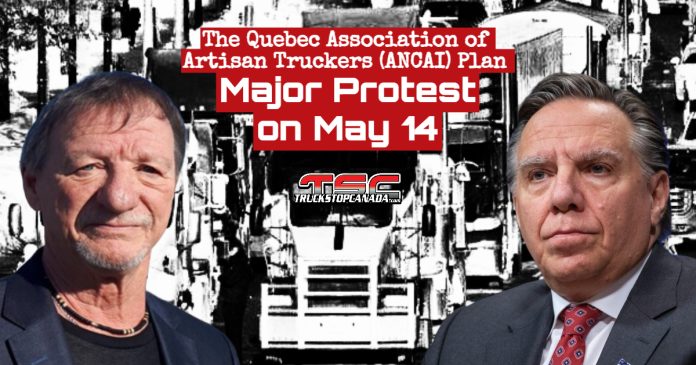Photo: Gaétan Légaré of ANCAI and Premier François Legault
Quebec’s artisan truckers, represented by the Quebec Association of Artisan Truckers Inc. (ANCAI), are preparing a large-scale protest in response to what they describe as the government’s persistent failure to enforce its own regulations—allowing conditions that fuel collusion, corruption, tax evasion, false billing, and environmental non-compliance in public bulk transportation projects.
During public hearings on Bill 62, several experts—including Yves Trudel (President of the Public Procurement Authority), Caroline Rivard (Deputy Auditor General of Quebec), and Martine Valois (a leading authority on public procurement law)—warned that the government’s current approach could revive the same conditions that led to systemic corruption uncovered by the Charbonneau Commission. This risk is especially acute in collaborative or public-private partnership (PPP) projects.
The Commission had clearly shown that bulk trucking, when not properly regulated in public markets, provides fertile ground for money laundering and fraudulent invoicing. Despite this, for-profit brokerage firms—explicitly criticized by the Commission—continue to operate in public procurement, now with apparent government approval.
Since 2012, the Ministry of Transport has allowed contractors to use any transportation company to supplement their own fleets. This has had two major consequences: a loss of local economic benefits when public investments are made in a region, and increased risk of integrity issues in bulk transport spending.
Local artisan truckers, who often respond first in emergencies such as floods and storms, now see external carriers taking over public contracts in their own communities—on projects they’ve waited decades for.
Recent media reports have also revealed that over 600 Quebec companies, including many in the transport sector, are linked to Mexican cartels and are allegedly used for money laundering operations.
ANCAI has made repeated submissions to the Ministry of Transport, the Treasury Board, and the Minister of Infrastructure, urging changes to ensure that only non-profit brokerages accredited by the Quebec Transport Commission (CTQ) are authorized to handle bulk trucking brokerage in public markets. This was also the Ministry’s stated position in a 2013 trucking bulletin.
Despite these warnings, the government continues to open public procurement to unregulated for-profit brokers. The SQI (Société québécoise des infrastructures) has unilaterally removed a long-standing clause from its tenders and contracts that had, for the past 15 years, ensured a minimum share of work for regional truckers. This directly contradicts Premier François Legault’s own 2019 statement:
“I believe we should always prioritize hiring people who live in the region. Nobody likes fly-in fly-out. We’re better off using people who are there permanently.”
ANCAI is now calling on Premier Legault to personally intervene. The association asserts that the solution is simple: the government must enforce its existing regulations on bulk trucking brokerage by requiring contractors to work exclusively with accredited non-profit organizations. These organizations are bound by fiduciary trust account rules that ensure full financial traceability—eliminating the risk of corruption, under-the-table payments, and fraudulent billing.
Importantly, ANCAI emphasizes that its proposed changes would not increase government spending. Truckers themselves cover the administrative costs of compliance under this model.
Frustrated by repeated government inaction despite numerous warnings, ANCAI’s board of directors has decided to escalate publicly.
During the organization’s annual congress in Saguenay from May 8–10, 2025, final plans will be set for a mass protest on May 14, with over 5,200 truckers expected to take to Quebec’s roads and gather at the National Assembly in Quebec City.
For ANCAI members, this protest is not only about protecting their economic survival—it is a call to uphold the integrity of public institutions and restore fairness to Quebec’s infrastructure procurement system.
What ANCAI Artisan Truckers Are Demanding :
For several years, ANCAI members have been calling for a comprehensive reform of Quebec’s bulk transportation system. Their key demands include:
- Restricting bulk brokerage to non-profit organizations accredited by the Quebec Transport Commission, including in collaborative and public-private partnership (PPP) projects, to prevent circumvention of the rules;
- Reintroducing clauses in public tenders—especially those managed by the Société québécoise des infrastructures (SQI)—that prioritize the hiring of regional truckers;
- Strengthening oversight of public project managers by enforcing the recommendations issued by the Auditor General of Quebec and the Public Procurement Authority;
- Combating tax evasion and illegal practices by requiring that all transport providers follow the same compliance standards;
- Protecting the integrity of public markets by ensuring that bulk transport remains a transparent, fair, and regionally anchored sector;
- Officially recognizing the role of artisan truckers in emergency response situations—such as floods or snowstorms—by integrating them into government response plans and acknowledging their critical contributions;
- Addressing the economic imbalance between large private firms and artisan truckers, in order to protect small regional businesses and maintain fair competition in the bulk transport industry.
Vallee-Jonction, QC: Five Months After Alexandra Poulin’s Death, Silence Still Reigns
















